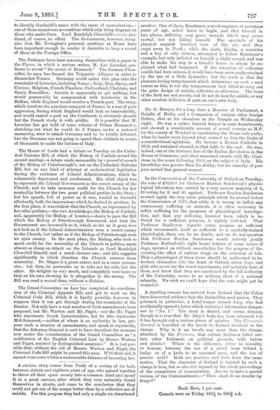The House of Lords had a debate on Tuesday on
the Cathedral Statutes Bill, of which the Bishop of Carlisle moved the second reading—a debate made memorable by n powerful speech -of the Bishop of Peterborough's, not on the Cathedral Statutes Bill, but on any kind of attempt at ecclesiastical legislation during the existence of Liberal Administrations, which he vehemently deprecated and condemned. His chief object was to represent the Liberal Government as the covert enemy of the Church, and to take immense credit for the Church for her -neutrality between the two great political parties in the State ; but his speech, full of power as it was, tended to discredit effectually both the impressions which he desired to produce. In -the first place, it was evident that the Church, as represented by ber other prelates,—the two Archbishops, the Bishop of Carlisle, and, apparently the Bishop of London,—desire to pass the Bill which the Bishop of Peterborough denounced, and that the Government are favourable to it, which, so far as it goes, does -not look as if the Liberal Administration were a covert enemy to the Church, but rather as if the Bishop of Peterborough were an open enemy. In the next place, the Bishop, who took so much credit for the neutrality of the Church in politics, made almost as sharp an attack on the Liberals as Lord Randolph Churchill himself, and a much cleverer one ; and this suggests significantly in which direction the Church swerves from neutrality. Dr. Magee is a great orator, and in a sense persuasive ; but then, he persuades us to take not his side, but the -other. He delights us very much, and completely convinces us that on his own showing he is altogether in the wrong. The Bill was read a second time, without a division.


































 Previous page
Previous page